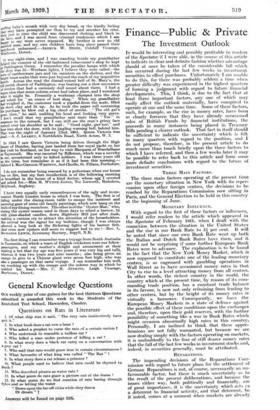MONETARY INFLUENCE.
With regard to the first of these factors or influences, I would refer readers to the article which appeared in the Spectator of February 16th, when I dealt with the connexion between the situation in the United States and the rise in our Bank Rate to A- per cent. It will be noted that since our own Bank Rate went up both the Italian and Dutch Bank Rates have risen, and it would not be surprising if some further European Bank Rates were to advance. The explanation is to be found in the fact that the New York Money Market, which is now supposed to constitute one of the leading monetary centres, is so engrossed with gambling operations in Wall Street as to have occasioned money rates in that City to rise to a level attracting money from all centres: In other words, the richest country in the world, the country which at the present time, by reason of its com- manding trade position, has a constant trade balance in its favour, is now not only refraining from lending to other centres, but by the height of its money rates is virtually a borrower. Consequently, we have the European Money Markets in a state of defence against the possible effect of these conditions upon the exchanges and, therefore, upon their gold reserves, with the further possibility of something like a war in Bank Rates which might occasion abnormally high rates in this country. Personally, I am inclined to think that these appre- hensions are not fully warranted, but because we are now dealing simply with the factors operating on markets, it is undoubtedly to the fear of still dearer money rates that the fall of the last few weeks in investment stocks and, indeed, in securities generally, must be attributed.


















































 Previous page
Previous page